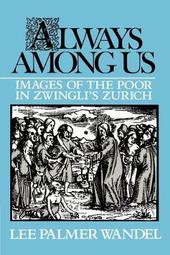
|
Always among Us: Images of the Poor in Zwingli's Zurich
Paperback / softback
Main Details
| Title |
Always among Us: Images of the Poor in Zwingli's Zurich
|
| Authors and Contributors |
By (author) Lee Palmer Wandel
|
| Physical Properties |
| Format:Paperback / softback | | Pages:208 | | Dimensions(mm): Height 229,Width 152 |
|
| Category/Genre | European history
Social and cultural history |
|---|
| ISBN/Barcode |
9780521522540
|
| Classifications | Dewey:362.50949457 362.5/09494/57 |
|---|
| Audience | | Professional & Vocational | |
|---|
| Illustrations |
Worked examples or Exercises
|
|
Publishing Details |
| Publisher |
Cambridge University Press
|
| Imprint |
Cambridge University Press
|
| Publication Date |
30 October 2003 |
| Publication Country |
United Kingdom
|
Description
In this elegantly written book, Lee Wandel discusses the relationship between the reform of poor relief and the Protestant Reformation in early sixteenth-century Zurich. In the introduction she traces the various ways that poverty had been evaluated, and its social and religious connotations, up to the sixteenth century. The first chapter provides a portrait of sixteenth-century Zurich. The next three chapters explore the discussion of the poor in various media of the town. The second chapter examines the sermons and pamphlets of Huldrych Zwingli, who was preaching that the poor were the true images of God. The third chapter addresses printed images depicting Christ calling beggars and other poor folk to Him, which appeared on title pages of Zwingli's pamphlets. The fourth chapter turns to the language of legislation, and in particular the poor ordinances of 1520 and 1525.
Reviews"Wandel has produced an elegant and crisp multidisciplinary profile of the reformation of charity in Zwingli's Zurich." William Monter, Journal of Interdisciplinary History "...much of the author's argument is highly convincing..." Christopher R. Friedrichs, Studies in Medieval and Renaissance History "...this book is to be commended for the concerted effort to weave together insights from different disciplines. It is particularly exciting to see the combination of visual imagery for the poor on Zwingli's pamphlets with the polemic against images in churches--a fascinating re-visioning of the commonplace that the Reformed tradition rejected religious art." Elsie McKee, Princeton Seminary Bulletin "...a carefully crafted, well-written study, and it is a welcome addition to the growing literature in English about Zurich during the Reformation period." J. Wayne Baker, Church History
|